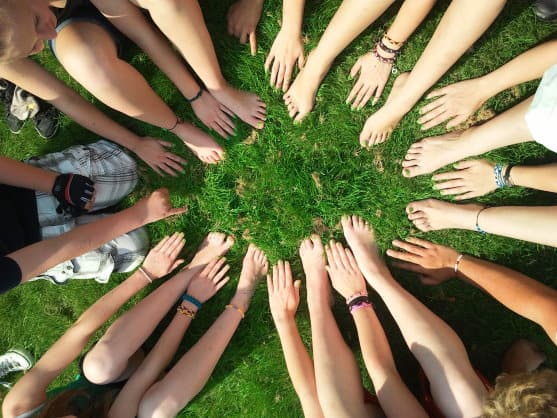The Social and Solidarity Economy is a way of implementing an economy that makes you feel that living is worth it!
Origin
The beginnings of the Social and Solidarity Economy (l’ESS) come from the onset of cooperativism, which emerged with the creation of consumer cooperatives in the industrial revolution in England. In that same era, the model of consumer cooperatives expanded to France, Germany and the Spanish State, where Catalonia and Valencia were pioneers in the creation of cooperatives (Culleré, Xavier).
Definition
The entities with l’ESS criteria are those that focus on giving priority to covering human needs instead of creating benefits and that also go beyond compliance with labor and environmental regulations. They produce products and services minimizing the environmental impact. They promote fair work practices, facilitate participation in work, transparency of information, pay and gender equity; they allow family and personal reconciliation. The criteria promote equitable and sustainable territorial development through: support for the local economy, community management initiatives, social and labor inclusion of people at risk of social exclusion, and support for other initiatives with the same values and ways of working. Additionally, part of its benefits are invested in some aspect of social and /or environmental efforts. (own preparations).
We can find initiatives of l’ESS from practically all sectors of the economy: from the production of goods and services, through financing-savings, distribution-exchange, to initiatives of responsible consumption; also in the sectors of food, communication, training, distribution, farm construction-reforms-administration, financing and insurance, and business services (consulting, holding events, revitalizing groups).
To be an entity of l’ESS, it is not necessary to have a specific legal form; the important thing is to fulfill the criteria. However, the cooperative is the legal form that is most commonly utilized, so that the criteria of l’ESS are met. Other legal forms common to the entities of l’ESS are: labor companies, mutual societies, special work centers, companies of inclusion, associations and foundations. We can also find initiatives without legal formalization such as: community gardens, collective credit funds, exchange markets and networking, community management facilities, and cultural and digital jointly-held properties.
L’ESS in Catalonia
The association of entities of the social and solidarity economy in Catalonia is the xes, at the level of the Spanish State Reas, and at the international level Ripess. In Catalonia, there are also other associations, confederations and federations that promote an economy with criteria and values of the social and/or solidarity economy such as: the Associació Catalana per al Foment de l’economía del Bé Com, the Confederació de Cooperatives de Catalunya, The Bussiness Confederation of the Third Social Sector of Catalonia, and the following federations: federation de Cooperatives de treball, federation de cooperatives agràries, federation de cooperatives d’habitatge, Federation of cooperatives of consumer and users , and federation of teaching cooperatives. The governmental organizations that promote the I´EES in Catalonia are Aracoop from the Departament de treball, afers socials and family of the Generalitat de Catalunya, and various departments from the Catalan municipalities that have created thexarxa de municipis per l’economia social i solidària, in Barcelona’s, the comissionat d’economia cooperativa, social i solidària, area of the first power of the Barcelona municipality.
In Barcelona, there are 4,800 initiatives that represent the cooperative, social and solidarity economy, which generate approximately 8% of the occupation in the city (website of the first authority of the Mayor of Barcelona).
The challenges of l’ESS
The ESS is formed not only by the entities that are managed with their criteria, but also by their interrelations or exchanges of goods and services, knowledge and generation of projects. It is through these relationships that sustainable territories or ecosystems can be built. It is a challenge to create spaces for inter-cooperation and the creation of sustainable ecosystems, like the one that took place this week coordinated by Respon.cat.
Greenevents is in allignment with the criteria of the social and solidarity economy and promotes this way of doing economy.
